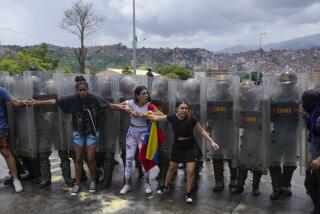Businessman Leads in Race for Guatemalan Presidency : Latin America: After the vote, electricity goes out all over the country. It may mark end to rebels’ 12-day truce.
- Share via
GUATEMALA CITY — As a prominent businessman took a substantial early lead in Sunday’s presidential race, the electricity went out all over Guatemala, provoking fears that the 12-day election truce may have ended.
“The truce is over,” an anonymous caller told a national radio station after the electricity failed shortly after midnight. “The struggle has resumed.”
The caller did not identify himself as a member of any specific faction of the guerrilla organizations that have waged Central America’s longest war and guerrilla exile offices could not immediately be reached to determine whether the blackout was the result of rebel action.
An electricity company official told a local television station that a main line had gone down but that the company was not sure whether it was because of sabotage or a technical failure.
The guerrillas had called a truce for the days before the voting to allow Guatemalans to easily participate in the first elections in three decades to be endorsed by all sectors of society. The cease-fire was scheduled to end at midnight tonight.
The clear front-runner in the election was Alvaro Arzu, a former mayor of the capital city and a member of Guatemala’s oligarchy, who by late Sunday had received 61% of the vote with 3% of precincts reporting, placing him clearly at the head of the field of 19 candidates for the presidency. Because early returns were from Guatemala City, his base of support, analysts expected his lead to narrow as results came in from rural precincts.
Pre-election polls had indicated Arzu would not receive the 50%-plus-one of the vote needed to win the race in the first round. Guatemalans were electing their vice president on the same ticket.
Arzu’s National Advancement Party (PAN) was also doing well in congressional races, with 55% of the vote. Opposition parties conceded the Guatemala City mayor’s race to the PAN candidate early in the evening. Results from the other 299 municipal elections were not yet available.
With 246 of the 7,532 precincts reporting, the 49-year-old Arzu had received three times as many votes as Alfonso Portillo--his nearest competitor and likely rival if there is a second round of voting on Jan. 7. Portillo, 44, is a last-minute surrogate for former dictator Gen. Efrain Rios Montt, who is barred by the constitution from running himself.
Early results also showed a far better performance for leftist candidates than pollsters had predicted as guerrillas participated in an election for the first time since Central America’s longest war began. Their party, the New Guatemala Democratic Front, was in a solid third place with 6% of the presidential vote and 11% of the congressional vote.
Substantial voter support is expected to strengthen the rebels’ negotiating stance in ongoing peace talks with the government.
Still, the front’s returns were far behind popular support for Arzu, a freckle-faced, strawberry-blond tennis player, seemingly an unlikely candidate to garner mass votes in this impoverished Indian nation. His election is expected to strengthen private-sector demands for free-market economic reforms.
Arzu is the latest example of the new style of Latin American politicians now directing the region’s emerging democracies. Well-educated and well-heeled, he has surrounded himself with an impressive team of technocrats who have aptly capitalized on the blunders of his rivals, such as the attempts of Rios Montt to circumvent the constitutional ban on his candidacy.
“He has always had the wisdom to surround himself with good people,” said Enrique Neutze, a family friend and president of the Agricultural, Commercial, Industrial and Financial Assns. Coordinating Committee, Guatemala’s most influential business organization.
Arzu is credited with having made the National Advancement Party (PAN), which he co-founded, a true political party--based on a shared belief in honesty and efficiency--rather than a vote-gathering machine to support a political boss, in the tradition of Guatemalan politics.
“Alvaro Arzu has had a great concern that the party not revolve around one person,” said Carlos Garcia, the 48-year-old PAN president and co-founder, who is also Arzu’s lawyer.
Arzu’s rivals, however, take a skeptical view of his qualifications for changing Guatemala’s economic and social structure.
“He talks about ending privileges, but he is being bankrolled by those who have the privileges,” said Portillo, a leftist who spent nearly two decades in exile before returning to Guatemala in 1990.
But before Arzu can put those ideas into practice, he will have to turn his first-round lead into a second-round majority. Having said he will not seek alliances with leaders of any other parties, he will have to attract their voters on his own.
“Unless he gets more than 34% in the first round,” Portillo predicted, “he doesn’t stand a chance.”
More to Read
Sign up for Essential California
The most important California stories and recommendations in your inbox every morning.
You may occasionally receive promotional content from the Los Angeles Times.













